Rob Mclennan's Blog, page 32
December 7, 2024
12 or 20 (second series) questions with Ivy Grimes
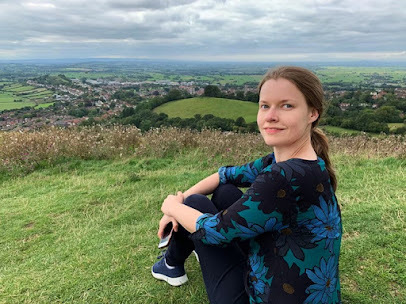
Ivy Grimes lives in Georgia, and herwriting has appeared in The Baffler, Maudlin House, hex, ergot.,Vastarien, and elsewhere. Her collection Glass Stories is available fromGrimscribe Press. For more, please visit www.ivyivyivyivy.com.
1 - How did your first book or chapbook changeyour life? How does your most recent work compare to your previous? How does itfeel different?
I just started it all! I had a fiction chapbook out lastyear: Grime Time. I had a lot of fun working with the editor, Matthew Stott, and I enjoyed my online conversations with everyone who read it. Mycurrent collection, Glass Stories, was also a lot of fun to edit, and Ialso loved working with editor Jon Padgett.
2 - How did you come to fiction first, as opposedto, say, poetry or nonfiction?
I actually started writing poetry first. It was quicker! Itransferred my energies to fiction once I realized how much more time I spentreading fiction than poetry. I love both, but fiction is the truer love of mywriting life.
3 - How long does it take to start any particularwriting project? Does your writing initially come quickly, or is it a slowprocess? Do first drafts appear looking close to their final shape, or doesyour work come out of copious notes?
I tend to either do things quickly or not at all. I also havemany more ideas for projects than I actually start. My first drafts are oftenrather close to their final shape, but I feel uneasy about that. I’d like toexperiment with more radical revisions. On the other hand, too much editing isdangerous for me since I want to be led by my unconscious mind rather than myanalytical mind. I suppose I can’t win!
4 - Where does a work of prose usually begin foryou? Are you an author of short pieces that end up combining into a largerproject, or are you working on a "book" from the very beginning?
With Glass Stories, I wrote a couple before I realizedI wanted to keep going. I got really excited by the idea of having a differentglass element in each story, and having a number of “Glass ____” stories. Theconcept came before the story for most of these, as it often does for me.Again, it’s the initial idea that excites me, and that excitement pushes methrough the sometimes-slog of finishing a project.
5 - Are public readings part of or counter toyour creative process? Are you the sort of writer who enjoys doing readings?
Heck no, I don’t enjoy giving readings…I don’t want to feelthe gruesome weight of everyone’s eyeballs on me!
6 - Do you have any theoretical concerns behindyour writing? What kinds of questions are you trying to answer with your work?What do you even think the current questions are?
I’m very interested in ideas about spirituality. I oftenexplore various kinds of anxiety as well. Often existential anxiety, which Isuppose goes hand-in-hand with spirituality. My hope is that when someone readsa story I’ve written, they leave with their own questions.
7 – What do you see the current role of thewriter being in larger culture? Do they even have one? What do you think therole of the writer should be?
I hate performing. I know that’s not what you’re talkingabout, but I can’t help but think of “roles” that way. I think ideally, anyperson (regardless of hobby or profession) cares about the world at large andtries to live with empathy and improve matters. I don’t think writers have aspecial call in this way, though, and I don’t think this care has to beexpressed in one’s writing. Ultimately, I think the role of the writer will bedifferent for each writer.
8 - Do you find the process of working with anoutside editor difficult or essential (or both)?
To be perfectly honest, neither! Working with an editor iswonderful because it helps me see my words from another perspective, and manyeditors have great ideas and a more thorough sense of the literary landscapethan I do. I don’t feel like I’ll die without an editor, though.
9 - What is the best piece of advice you've heard(not necessarily given to you directly)?
When lecturing about storytelling, Kurt Vonnegut said - “Thetruth is, we know so little about life, we don't really know what the good newsis and what the bad news is.” He was giving the example of Hamlet, howmany of the events in the play aren’t obviously good or bad, but simply thingsthat happen to Hamlet. I think this advice favors storytelling that allows thereader to wonder rather than telling them what to think. It also encouragessomeone to retain a sense of humility and mystery about writing as well aslife, which for me is essential to survival.
10 - How easy has it been for you to move betweengenres (short stories to the novel)? What do you see as the appeal?
Shorter and longer fictions each have their challenges forme. Short fictions are easier to tackle, but longer fictions give me more spaceto play around. I enjoy the thrill of a quick short story, of course, and Iappreciate that its world can be much more sparsely decorated. On the otherhand, I also enjoy telling longer stories without having to create a new worldevery few pages.
11 - What kind of writing routine do you tend tokeep, or do you even have one? How does a typical day (for you) begin?
I don’t adhere to a writing schedule. On days when I write,sometimes I like to keep hammering away, and other times I come and go. I add alittle here, subtract a little there, and in between, I look up a bunch ofstuff online.
12 - When your writing gets stalled, where do youturn or return for (for lack of a better word) inspiration?
Fun facts, history, new films, old films, art museums,poetry, surrealism, memories of childhood landscapes, favorite authors, fairytales….
13 - What fragrance reminds you of home?
Magnolia blossoms, with their hot lemon breath.
14 - David W. McFadden once said that books comefrom books, but are there any other forms that influence your work, whethernature, music, science or visual art?
Other than books, I’m most conscious of the fact that filmsinfluence me. For example, was an important influence for me inwriting eerie, strange fiction.
15 - What other writers or writings are importantfor your work, or simply your life outside of your work?
Too many, with more to come! Every writer I’ve encounteredhas been important in some sense. Some writers who’ve especially influenced mywriting include Kafka, Beckett, Murakami, James Joyce, Flannery O’Connor,Barbara Comyns, Lorrie Moore, Dostoevsky, Toni Morrison, Kurt Vonnegut, Evelyn Waugh, Kazuo Ishiguro, Barbara Pym, Tana French, Raymond Chandler, Maya Angelou, Donna Tartt, Richard Brautigan, Ralph Ellison, Tove Jansson, Tolkien,the Victorians, Sayaka Murata, Iris Murdoch, Paul Auster, etc., etc.
16 - What would you like to do that you haven'tyet done?
Reach enlightenment!
17 - If you could pick any other occupation toattempt, what would it be? Or, alternately, what do you think you would haveended up doing had you not been a writer?
I have a lot of half-baked pastoral dreams of farming orshepherding. I’m not crazy about getting my hands dirty, though, truth betold.
18 - What made you write, as opposed to doingsomething else?
I’ve always loved to read so much. It’s one of my veryfavorite things in life. That’s the only reason.
19 - What was the last great book you read? Whatwas the last great film?
I really enjoyed the memoir Work by Bud Smith, whichis about his experiences working heavy construction and growing up in NewJersey. He’s very funny and finds poetry in unusual places.
I’ve been going through the Japanese Horror section of the Criterion Channel, and I especially enjoyed a film called Cure byKiyoshi Kurosawa. I haven’t even watched half of these movies yet, though, so Ihave more to go!
20 - What are you currently working on?
I’m doing secret experiments in the semi-darkness.
December 6, 2024
some calgary, amid the foothills, snow;
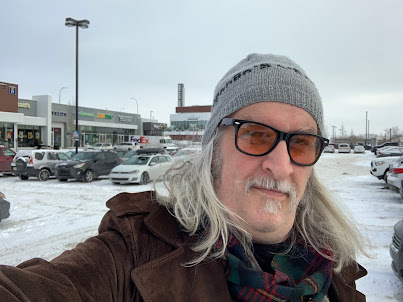 Christine and I and our wee two monsters were in Calgary not that long back, I'm sure you might have known. You probably saw my prior notes on our Toronto and Kingston readings and adventures [or my notes from reading in London, Ontario in January; or my notes on reading in Toronto last December]. We were in town to read as part of the single onion reading series over at Shelf Life Books, but more on that in a moment. We were a few days in Calgary for the sake of a reading, but flying out on Rose's eleventh birthday, so we certainly couldn't leave them behind, taking them along for the trip, and staying with Christine's aunt and uncle who live there, somewhere.
Christine and I and our wee two monsters were in Calgary not that long back, I'm sure you might have known. You probably saw my prior notes on our Toronto and Kingston readings and adventures [or my notes from reading in London, Ontario in January; or my notes on reading in Toronto last December]. We were in town to read as part of the single onion reading series over at Shelf Life Books, but more on that in a moment. We were a few days in Calgary for the sake of a reading, but flying out on Rose's eleventh birthday, so we certainly couldn't leave them behind, taking them along for the trip, and staying with Christine's aunt and uncle who live there, somewhere.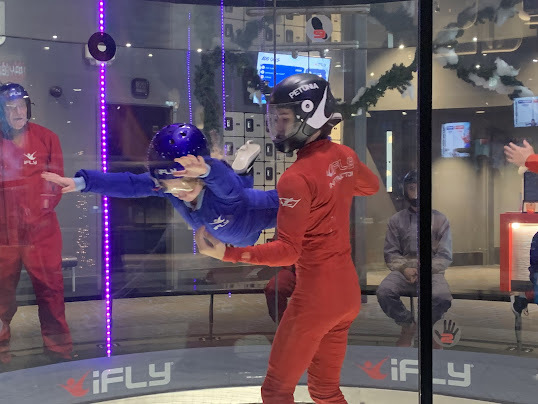
Our first day was a bit of a wander, heading over to a mall to catch lunch (as much of Calgary does seem designated "mall space," it would seem) and see what options our young ladies might have for clothes-shopping. After begging for months, we booked Rose (and Aoife) for iFLY, an indoor skydiving place. They were booked two rounds each, and Rose really had been begging for this for months; of course, she hated it. Aoife took three rounds, instead, and completely loved it. Rose appreciated the experience, but basically never wishes to ever do that again.


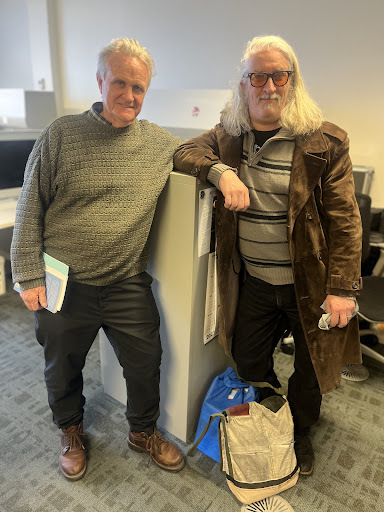 [above: me (left) and a bear statue (right)] It did look rather fun, but I'm not sure I'd be open to such, either. From there, we headed over to the University of Calgary Press offices, quickly, where I got to meet my publisher, Brian Scrivener [his ABC Bookworld profile is wildly out-of-date, I'd say] for the first time, and found out that my next collection through the press, the book of sentences, has a scheduled release date of October 15, 2025, so that was pretty exciting (I should probably be thinking about tour plans, possibly). And I was given a copy of my pal Andy Weaver's new poetry collection,
The Loom
[which I've already reviewed over here]. The young ladies were bored out of their minds at the visit to the office, to the campus, quietly writhing around on the carpeted floor (we didn't stay long).
[above: me (left) and a bear statue (right)] It did look rather fun, but I'm not sure I'd be open to such, either. From there, we headed over to the University of Calgary Press offices, quickly, where I got to meet my publisher, Brian Scrivener [his ABC Bookworld profile is wildly out-of-date, I'd say] for the first time, and found out that my next collection through the press, the book of sentences, has a scheduled release date of October 15, 2025, so that was pretty exciting (I should probably be thinking about tour plans, possibly). And I was given a copy of my pal Andy Weaver's new poetry collection,
The Loom
[which I've already reviewed over here]. The young ladies were bored out of their minds at the visit to the office, to the campus, quietly writhing around on the carpeted floor (we didn't stay long).Once back to the house, Christine's aunt Nancy had some dinner for the young ladies and a birthday cake and gifts for Rose, as well as the neighbour teen to babysit; our quartet of grown-ups went out for pre-reading dinner, meeting up with a cousin of Christine's I hadn't met yet (who lives in Calgary, and was delightful).

 The Calgary crowd at our reading was energized, lively. What a fine crowd! Christine and I both noticed that the audience were reacting to elements of our readings we weren't used to hearing responses to, so that was pretty interesting. There was even a live-stream for those unable to attend in-person, although I can't seem to figure out if that same recording is available archivally online anywhere. Hm.
The Calgary crowd at our reading was energized, lively. What a fine crowd! Christine and I both noticed that the audience were reacting to elements of our readings we weren't used to hearing responses to, so that was pretty interesting. There was even a live-stream for those unable to attend in-person, although I can't seem to figure out if that same recording is available archivally online anywhere. Hm.It was grand to see Colin Martin, Nikki Sheppy, Weyman Chan [see my review of his latest], Adrienne Adams and Monica Kidd (new novel out next year, you know)! It was grand to meet Ben Berman Ghan (I bought his new book, as I've heard very good things about it) and Ian FitzGerald! There was another event the same night in Calgary as ours, which did mean a couple of folk were unable to attend (an enviable-sounding talk by Anna Veprinska that sounded pretty cool; did you know she was there now?). The bookstore also held a remarkable selection of books, more than a few titles I had to pick up while there. Calgary, you have a very good bookstore. The store even sold out of the stack of my new short story collection, which provided me the opportunity for me (I checked with the store first, of course) to even sell a couple of copies out of my bag.

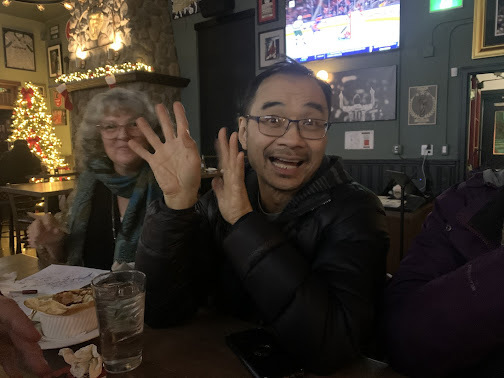
[Weyman, above] After the reading, Christine's energy was run out, but we discovered (randomly) that the reading host lives four houses away from Christine's aunt, so it allowed me to head out for drinks, which was rather fortunate. It was good to hang out with Weyman again; it had been a few years, since a ridiculous story of hanging out post-reading with one of Monty Reid's stepsons (who was still living in Calgary at the time), and Weyman insisting we call Monty on the phone (we did; um, remember there's a time-zone thing between 10pm Calgary and Ottawa, eh Weyman?). Apparently Weyman had been part of a group of students that travelled with Robert Kroetsch and Aritha Van Herk out to Drumheller many moons ago (Kroetsch describes the outing in his updated Alberta, which I do recommend).

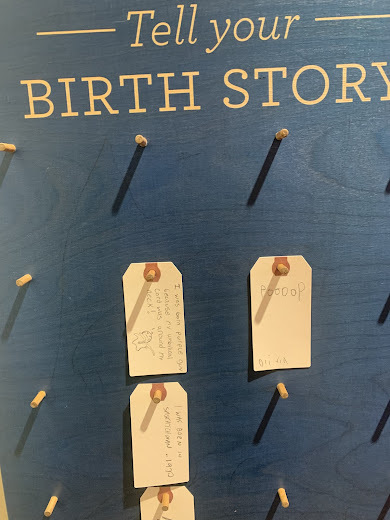
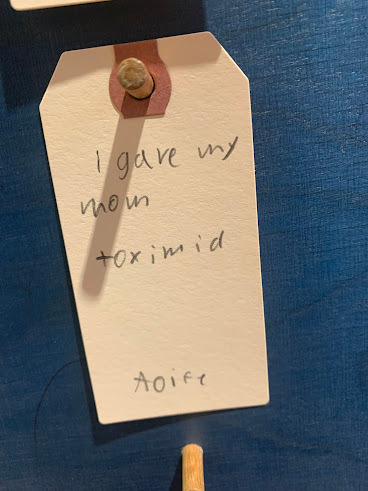 The following morning, we managed to make up the trip for Rose (she didn't want to come along; and the flying thing made her grumpy) with a visit to their science centre, which was enormously cool. We could have spent the whole day there, and the young ladies (as well as us, and Aunt Nancy) were delighted. There were plenty of extremely cool exhibits, including a room of particle-light I can't even begin to describe, a device that flung them around in the air (Rose and Aoife each went at least twice), a bed of nails everyone (sans myself) tried, a board where one can write and affix their birth stories (I was tempted, but my story is rather sordid, honestly, with some sadnesses within). Aoife wrote a sad one also: "I gave my mom toxemia." God sakes (we had a wee chat about that after, to clarify that Christine's illnesses weren't "their fault" or anything as such).
The following morning, we managed to make up the trip for Rose (she didn't want to come along; and the flying thing made her grumpy) with a visit to their science centre, which was enormously cool. We could have spent the whole day there, and the young ladies (as well as us, and Aunt Nancy) were delighted. There were plenty of extremely cool exhibits, including a room of particle-light I can't even begin to describe, a device that flung them around in the air (Rose and Aoife each went at least twice), a bed of nails everyone (sans myself) tried, a board where one can write and affix their birth stories (I was tempted, but my story is rather sordid, honestly, with some sadnesses within). Aoife wrote a sad one also: "I gave my mom toxemia." God sakes (we had a wee chat about that after, to clarify that Christine's illnesses weren't "their fault" or anything as such).Next, Christine's aunt Nancy dropped us at Christine's former (retired) work-colleage/work-mom Sheri's place, where we had dinner with her and her husband, and the young ladies played happily with Sheri's grandson, a trio that worked far better than we could have hoped.

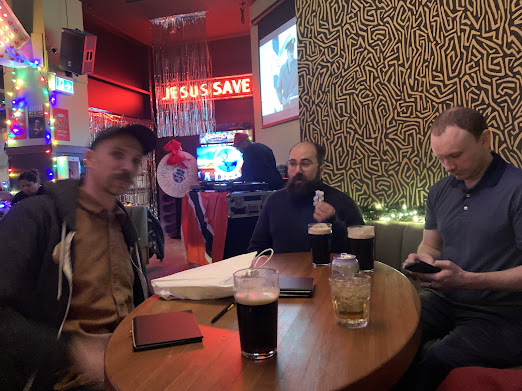 [left: Kevin, Ben, Ken] From there? Nancy returned to collect us, and dropped Christine and I at a pub downtown, where I had organized a pub night at Tubby's with Kevin Stebner (new book with Assembly Press!), since he couldn't make the event the night prior. Nancy took the kids back to her place, and we got to hang out with a flurry of Calgary writers (the venue recommended by Kevin himself), including Ben Berman Ghan (that guy again), Samantha Jones, Ken Hunt (he still exists!), Ethan Vilu (who was good enough to hand out a couple of copies of the latest
filling Station
) and even Nikki Sheppy, who floated through briefly across the mighty snow.
[left: Kevin, Ben, Ken] From there? Nancy returned to collect us, and dropped Christine and I at a pub downtown, where I had organized a pub night at Tubby's with Kevin Stebner (new book with Assembly Press!), since he couldn't make the event the night prior. Nancy took the kids back to her place, and we got to hang out with a flurry of Calgary writers (the venue recommended by Kevin himself), including Ben Berman Ghan (that guy again), Samantha Jones, Ken Hunt (he still exists!), Ethan Vilu (who was good enough to hand out a couple of copies of the latest
filling Station
) and even Nikki Sheppy, who floated through briefly across the mighty snow.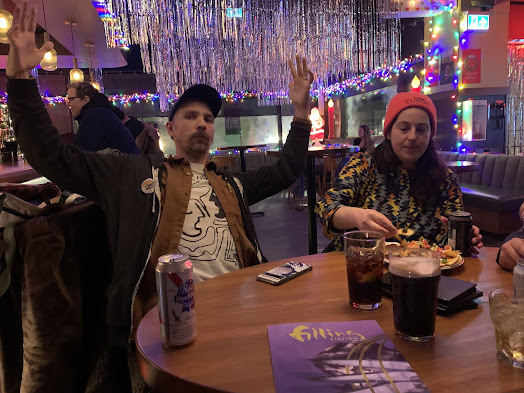 [Kevin bein' awesome and Samantha being coy] It was a second glorious night across an array of glorious nights. Samantha had been to visit a few months prior in Ottawa, and I can't even recall the last time I saw Ken Hunt, but the rest I was meeting for the first time on this trip, so that was very, very nice. I had envelopes of chapbooks for various folk, as I tend to do, especially during these dark days of another Canada Post strike (give the workers what they want, I say; do it now!).
[Kevin bein' awesome and Samantha being coy] It was a second glorious night across an array of glorious nights. Samantha had been to visit a few months prior in Ottawa, and I can't even recall the last time I saw Ken Hunt, but the rest I was meeting for the first time on this trip, so that was very, very nice. I had envelopes of chapbooks for various folk, as I tend to do, especially during these dark days of another Canada Post strike (give the workers what they want, I say; do it now!).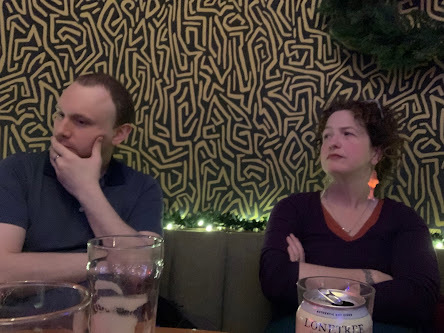 [Ken Hunt and Christine looking thoughtful, listening intently to the wisdom of Ben Berman Ghan]
[Ken Hunt and Christine looking thoughtful, listening intently to the wisdom of Ben Berman Ghan]

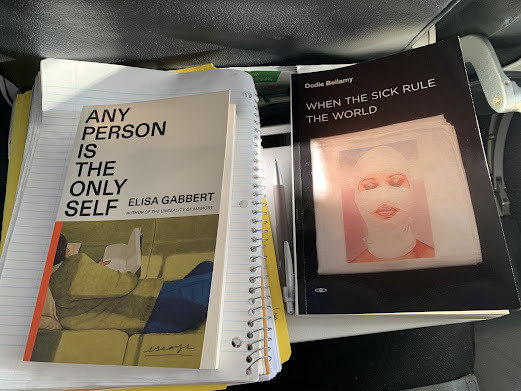 The next day, we'd been originally hoping to drive out to Banff, or, failing that, Drumheller, but Calgary managed a record amount of snowfall, so that didn't happen. We made for another mall, took the young ladies to see Wicked, part one (which they considered "mid," or at least all they were willing to offer). And then, an early morning flight back to Ottawa, nestled back into our corners by mid-afternoon. I did manage a ton of notes on both flights, but I'm still working my slow way through all of them. It will come, soon enough.
The next day, we'd been originally hoping to drive out to Banff, or, failing that, Drumheller, but Calgary managed a record amount of snowfall, so that didn't happen. We made for another mall, took the young ladies to see Wicked, part one (which they considered "mid," or at least all they were willing to offer). And then, an early morning flight back to Ottawa, nestled back into our corners by mid-afternoon. I did manage a ton of notes on both flights, but I'm still working my slow way through all of them. It will come, soon enough.December 5, 2024
12 or 20 (second series) questions with Moshe Zvi Marvit
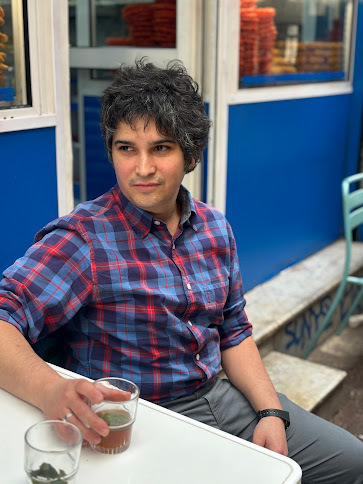 Moshe Zvi Marvit's work has appeared in The New York Times, The Washington Post, The Nation, The New Republic, Dissent Magazine, In These Times, The American Prospect, The Bellevue Literary Review, and elsewhere. He has been awarded the Sidney Hillman Prize, The Ken May Media Award, a Mesa Refuge Writing Residency, and was shortlisted for the Studs Terkel Prize.
Nothing Vast
is his first novel.
Moshe Zvi Marvit's work has appeared in The New York Times, The Washington Post, The Nation, The New Republic, Dissent Magazine, In These Times, The American Prospect, The Bellevue Literary Review, and elsewhere. He has been awarded the Sidney Hillman Prize, The Ken May Media Award, a Mesa Refuge Writing Residency, and was shortlisted for the Studs Terkel Prize.
Nothing Vast
is his first novel.1 - How did your first book change your life? How does your most recent work compare to your previous? How does it feel different?
It's too soon to tell how and if my first novel, Nothing Vast, might change my life, but it's a departure from my previous work. Most of my writing until now has been non-fiction or journalism and about labor and work, often with a policy or legal bent. I found writing fiction much more difficult.
2 - How did you come to non-fiction first, as opposed to, say, fiction or poetry?
I have always been interested in issues surrounding work, and when I started publishing around 2010, there was a real dearth of people writing about these issues. I started pitching pieces and was surprised to see a real interest in the subject. Pretty soon, I was offered a fellowship at a think tank, which provided real institutional support to write about labor and employment.
3 - How long does it take to start any particular writing project? Does your writing initially come quickly, or is it a slow process? Do first drafts appear looking close to their final shape, or does your work come out of copious notes?
I feel like I sit with the idea for a long time before ever writing. Once I start in earnest, it seems to proceed quickly at first, then long periods of not looking at the project, before plodding along to the end. I almost never have an outline or organized notes, because the thing that keeps me going is wanting to know what will happen. As I write, I feel like I get boxed in and there are fewer paths I can choose or decisions I have to make, until it comes to a close.
4 - Where does a work of prose usually begin for you? Are you an author of short pieces that end up combining into a larger project, or are you working on a "book" from the very beginning?
I used to write (though rarely sought publication) of short stories, and could not have imagined trying to write a novel. It felt like everything that was necessary for the story always fit easily in a 5,000 word arc. Now, after spending a lot of time in book form, I have tried to return to short stories, and find it incredibly difficult to be limited to so few pages. I'd like to be able to do both, but for the foreseeable future, I assume that every project I begin will be conceived as a book. Whether the whole book gets written is another matter.
5 - Are public readings part of or counter to your creative process? Are you the sort of writer who enjoys doing readings?
I have largely avoided doing readings, because I assumed I would not enjoy them. Having said that, I have enjoyed the few I have done.
6 - Do you have any theoretical concerns behind your writing? What kinds of questions are you trying to answer with your work? What do you even think the current questions are?
The story in Nothing Vast is about families, and the stories they tell to form their identities. Beyond that, it's a story of migration and loss, and how people situate themselves in history. The form of the story tries to fit the substance in a manner that might prove difficult for some readers, but I hope will ultimately serve the purpose of making it more relatable.
7 – What do you see the current role of the writer being in larger culture? Do they even have one? What do you think the role of the writer should be?
I think of the fiction writer as someone who can capture our attentions and change our perceptions, either through their internal logic or the stories they choose to tell. Our attention is so dispersed by disparate streams of information, which we typically funnel into our predetermined paradigms. But a good story has the potential to challenge one's narrative and sit with a reader indefinitely.
8 - Do you find the process of working with an outside editor difficult or essential (or both)?
Working with an outside editor is always difficult, always essential, and sometimes fantastic. I've been really lucky to have worked with fantastic editors at the nonfiction outlets I used to write for, and at Acre Books for Nothing Vast. I have also worked with some problematic editors, who view writing solely through the commercial lens, or try to temper the writing to reach a broader audience, or try to substitute their writing and vision for the writers. These experiences have made me thankful for the truly wonderful editors that I have worked with on so many occasions.
9 - What is the best piece of advice you've heard (not necessarily given to you directly)?
At best, your first draft has the potential to be good.
10 - How easy has it been for you to move between genres (fiction to non-fiction)? What do you see as the appeal?
It has been extremely difficult to move between fiction and non-fiction and back to fiction. I know that some people do it easily, but for me, it feels next to impossible. Writing non-fiction for me is very routine based. I have to be steeped in the subject matter and have to constantly be working and putting things out. Once I slow down or stop, starting becomes a heavy lift. As opposed to that, writing fiction requires me to have space to take my time and not rush things. For that reason, fiction takes me much longer.
11 - What kind of writing routine do you tend to keep, or do you even have one? How does a typical day (for you) begin?
My fiction writing routines center around travel. I write best on trains and planes and away from home.
12 - When your writing gets stalled, where do you turn or return for (for lack of a better word) inspiration?
I wish I had an answer for this. I hate the advice I've heard on how best to get past a period where I don't or can't write, and it never works for me.
13 - What fragrance reminds you of home?
It's a unique blend of the Monongahela River meeting the nacho-cheese smell of rotting leaves meeting the faint exhaust of the Edgar Thomson Works.
14 - David W. McFadden once said that books come from books, but are there any other forms that influence your work, whether nature, music, science or visual art?
Cities really influence my work. There is a way in which every city has its own form of chaos and order that feels constant and unique to that city. For me, the really great books are the ones that capture a city in a way that gives you access to its character and energy.
15 - What other writers or writings are important for your work, or simply your life outside of your work?
I have a small community of writers whose work and conversations are essential to my own work.
16 - What would you like to do that you haven't yet done?
Learn Arabic.
17 - If you could pick any other occupation to attempt, what would it be? Or, alternately, what do you think you would have ended up doing had you not been a writer?
My day job is as a lawyer, but if writing fiction could be an occupation for me, I'd do that.
18 - What made you write, as opposed to doing something else?
I took the path of many failed writers and became a lawyer.
19 - What was the last great book you read? What was the last great film?
The last great book I read was An Island, by Karen Jennings. I found it on a used book rack, and had no idea what to expect when I picked it up, but it surprised me at every turn. I looked it up afterward and was surprised to find that it had originally come out on a tiny press on a run of 500 or so, until it was longlisted for the Booker Prize and people took notice of this amazing little book. I realized how rare it has become for me to accidentally chance upon a great book, without first reading a review or knowing that it had won an award, which has since encouraged me to pick up random books and give them a shot. It also reminded me how many great books come out on tiny presses that I've never heard of, and those are often the books that are trying something truly new and interesting.
20 - What are you currently working on?
I don't like to talk about projects until I'm done because the ideas seem so fragile at this stage and I fear them disappearing.
12 or 20 (second series) questions;
December 4, 2024
Stephen Collis, The Middle
I tried to speak of the
times but there were
too many and
glancing
some like blows turned
in a twilight they had
created turned and I’m
sure like a bird or
something more seed-likeso
/ even the mighty riverburned /
and darting bent back
on their lines of flight
so that the yellow trees
were our fellow
travellers
and gave what they had to
spore or to flames we
took to be the earth’sown
vascular system unlockedby the
hot wind was ourbreathing was
common
as the dense mycelial air(“FIRST MOVEMENT”)
 Vancouver poet, editor, writer and critic Stephen Collis’ latest full-length poetry titleis
The Middle
(Vancouver BC: Talonbooks, 2024), furthering his array of poetrycollections that speak to elements of climate crisis, social politics, communityand human responsibility that include Anarchive (Vancouver BC: New StarBooks, 2005),
The Commons
(Talonbooks, 2008/2014),
To the Barricades
(Talonbooks, 2013) [see my review of such here],
Once in Blockadia
(Talonbooks, 2016) [see my review of such here] and
A History of the Theories of Rain
(Talonbooks, 2021)[see my review of such here]. Each collection of his to date is crafted as abook-length poem, but one that has evolved into an extended, ongoing trajectoryof thought, writing from the deepest part of the centre. “To be in the middleis to be in relation,” he writes as part of his “PREFACE,” “moving between.” Acrossa sequence of “MOVEMENTS” and numbered “CANTOS,” it is curious to see theevolution of his ongoing work, and how he sets himself firmly in the traditionand foundation of the work of the late Robin Blaser (1925-2009): if the forestis indeed holy, one might suggest, then it requires protecting. As his “PREFACE”continues, a bit further along: “This long poem grown from the middle of lifecomes in three parts. The first finds its seeds in the assembling of a smalllibrary of Robin Blaser’s books – a decade after the poet’s death, his booksarrived at the university where I work, like a long-whispered echo through thetrees. so I ran through the Holy Forest like a madman – there was some urgency,the librarians said – so I ran, pulling quotations from volumes like branchesbroken from the trees, apples caught as they fell.”
Vancouver poet, editor, writer and critic Stephen Collis’ latest full-length poetry titleis
The Middle
(Vancouver BC: Talonbooks, 2024), furthering his array of poetrycollections that speak to elements of climate crisis, social politics, communityand human responsibility that include Anarchive (Vancouver BC: New StarBooks, 2005),
The Commons
(Talonbooks, 2008/2014),
To the Barricades
(Talonbooks, 2013) [see my review of such here],
Once in Blockadia
(Talonbooks, 2016) [see my review of such here] and
A History of the Theories of Rain
(Talonbooks, 2021)[see my review of such here]. Each collection of his to date is crafted as abook-length poem, but one that has evolved into an extended, ongoing trajectoryof thought, writing from the deepest part of the centre. “To be in the middleis to be in relation,” he writes as part of his “PREFACE,” “moving between.” Acrossa sequence of “MOVEMENTS” and numbered “CANTOS,” it is curious to see theevolution of his ongoing work, and how he sets himself firmly in the traditionand foundation of the work of the late Robin Blaser (1925-2009): if the forestis indeed holy, one might suggest, then it requires protecting. As his “PREFACE”continues, a bit further along: “This long poem grown from the middle of lifecomes in three parts. The first finds its seeds in the assembling of a smalllibrary of Robin Blaser’s books – a decade after the poet’s death, his booksarrived at the university where I work, like a long-whispered echo through thetrees. so I ran through the Holy Forest like a madman – there was some urgency,the librarians said – so I ran, pulling quotations from volumes like branchesbroken from the trees, apples caught as they fell.” The deep middleness ofthings compels me – this fraught stretch of life between certain pasts (let’srecall, if only a few, colonial land grabs, empires in their always-newclothes, vast carbon incinerations) and uncertain futures (can we yet dream ofa time when all will come to have a relationship with the earth that iswelcoming and mutually sustaining?). I am writing this in a winged hut at theback of my mind, which is to say deep in an imaginary forest (where there areno actual trees) – a place I find whenever I’m surrounded by books and silence.That’s a middle of things that necessarily feels like respite, an eddy in theflow, as opposed to the middleness that feels like a slow-motion tumbling – inmedias res – as the planet tips, and the turtle sloughs off that’s beenbuilt off its back.
The Middle presents itself as a book-length poem ofperpetual love, despite all ecological trauma we’ve inflicted upon the both theplanet and ourselves, but articulating the conflict held between that devastation,that love. Self-described as an extension of Collis’ ongoing “investigation ofthreatened climate futures into a poetics of displacement and wandering,” TheMiddle is the second volume of a projected trilogy; as a layering of onepoem atop another, an expansive and introspective questioning of climate actionand inaction, of state response; of music, movements and cantos, employingBlaser’s element of song across his examinations of the earth. “Without stopping/ one after the other / lit out / for all haste / you move / your image moves,”begins “CANTO 25,” “words remain human / like blood coagulates / and quickens /like a plant / or sea fungus forming / from the begetter’s heart [.]” There’s athickness to the collection, an intellectual and lyric heft, blended in such away to not allow either to get in the way of the other, but intermingle comfortably;akin to the work of Blaser, one might say, able to absorb and engage with elementsfrom his surroundings, his community, into something unique, lyric and purelyhis own. As he offers as part of his “NOTES” at the back of the collection:
To cite in poetry, I havebelieved, is to participate in the commons that poetry exhibits better than anyother genre: our literary resources are shared, a common treasury for all.Citation may also be a form of solidarity. But I am compelled to note my sourceshere because, as Fady Joudah has said, “There is a solidarity whose horizon isassimilation, and there is a solidarity whose horizon is liberation. The formeris hierarchical to those it is in solidarity with. The latter is in communitywith them. The former treats them as abstraction. The latter is citational. Itnames those it loves” (The New Inquiry). I would name what I love, andbe in community with the many writers whose work I gratefully take up here.
December 3, 2024
Spotlight series #104 : Jessi MacEachern
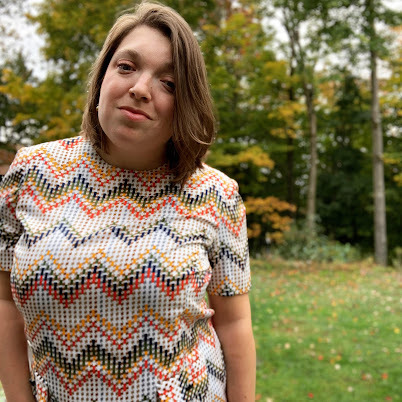 The one hundred and fourth in my monthly "spotlight" series, each featuring a different poet with a short statement and a new poem or two, is now online, featuring Montreal-based poet, professor and scholar of feminist poetics, Jessi MacEachern
.
The one hundred and fourth in my monthly "spotlight" series, each featuring a different poet with a short statement and a new poem or two, is now online, featuring Montreal-based poet, professor and scholar of feminist poetics, Jessi MacEachern
.
The first eleven in the series were attached to the Drunken Boat blog, and the series has so far featured poets including Seattle, Washington poet Sarah Mangold, Colborne, Ontario poet Gil McElroy, Vancouver poet Renée Sarojini Saklikar, Ottawa poet Jason Christie, Montreal poet and performer Kaie Kellough, Ottawa poet Amanda Earl, American poet Elizabeth Robinson, American poet Jennifer Kronovet, Ottawa poet Michael Dennis, Vancouver poet Sonnet L’Abbé, Montreal writer Sarah Burgoyne, Fredericton poet Joe Blades, American poet Genève Chao, Northampton MA poet Brittany Billmeyer-Finn, Oji-Cree, Two-Spirit/Indigiqueer from Peguis First Nation (Treaty 1 territory) poet, critic and editor Joshua Whitehead, American expat/Barcelona poet, editor and publisher Edward Smallfield, Kentucky poet Amelia Martens, Ottawa poet Pearl Pirie, Burlington, Ontario poet Sacha Archer, Washington DC poet Buck Downs, Toronto poet Shannon Bramer, Vancouver poet and editor Shazia Hafiz Ramji, Vancouver poet Geoffrey Nilson, Oakland, California poets and editors Rusty Morrison and Jamie Townsend, Ottawa poet and editor Manahil Bandukwala, Toronto poet and editor Dani Spinosa, Kingston writer and editor Trish Salah, Calgary poet, editor and publisher Kyle Flemmer, Vancouver poet Adrienne Gruber, California poet and editor Susanne Dyckman, Brooklyn poet-filmmaker Stephanie Gray, Vernon, BC poet Kerry Gilbert, South Carolina poet and translator Lindsay Turner, Vancouver poet and editor Adèle Barclay, Thorold, Ontario poet Franco Cortese, Ottawa poet Conyer Clayton, Lawrence, Kansas poet Megan Kaminski, Ottawa poet and fiction writer Frances Boyle, Ithica, NY poet, editor and publisher Marty Cain, New York City poet Amanda Deutch, Iranian-born and Toronto-based writer/translator Khashayar Mohammadi, Mendocino County writer, librarian, and a visual artist Melissa Eleftherion, Ottawa poet and editor Sarah MacDonell, Montreal poet Simina Banu, Canadian-born UK-based artist, writer, and practice-led researcher J. R. Carpenter, Toronto poet MLA Chernoff, Boise, Idaho poet and critic Martin Corless-Smith, Canadian poet and fiction writer Erin Emily Ann Vance, Toronto poet, editor and publisher Kate Siklosi, Fredericton poet Matthew Gwathmey, Canadian poet Peter Jaeger, Birmingham, Alabama poet and editor Alina Stefanescu, Waterloo, Ontario poet Chris Banks, Chicago poet and editor Carrie Olivia Adams, Vancouver poet and editor Danielle Lafrance, Toronto-based poet and literary critic Dale Martin Smith, American poet, scholar and book-maker Genevieve Kaplan, Toronto-based poet, editor and critic ryan fitzpatrick, American poet and editor Carleen Tibbetts, British Columbia poet nathan dueck, Tiohtiá:ke-based sick slick, poet/critic em/ilie kneifel, writer, translator and lecturer Mark Tardi, New Mexico poet Kōan Anne Brink, Winnipeg poet, editor and critic Melanie Dennis Unrau, Vancouver poet, editor and critic Stephen Collis, poet and social justice coach Aja Couchois Duncan, Colorado poet Sara Renee Marshall, Toronto writer Bahar Orang, Ottawa writer Matthew Firth, Victoria poet Saba Pakdel, Winnipeg poet Julian Day, Ottawa poet, writer and performer nina jane drystek, Comox BC poet Jamie Sharpe, Canadian visual artist and poet Laura Kerr, Quebec City-area poet and translator Simon Brown, Ottawa poet Jennifer Baker, Rwandese Canadian Brooklyn-based writer Victoria Mbabazi, Nova Scotia-based poet and facilitator Nanci Lee, Irish-American poet Nathanael O'Reilly, Canadian poet Tom Prime, Regina-based poet and translator Jérôme Melançon, New York-based poet Emmalea Russo, Toronto-based poet, editor and critic Eric Schmaltz, San Francisco poet Maw Shein Win, Toronto-based writer, playwright and editor Daniel Sarah Karasik, Ottawa poet and editor Dessa Bayrock, Mahone Bay, Nova Scotia poet Alice Burdick, poet, writer and editor Jade Wallace, San Francisco-based poet Jennifer Hasegawa, California poet Kyla Houbolt, Toronto poet and editor Emma Rhodes, Canadian-in-Iowa writer Jon Cone, Edmonton/Sicily-based poet, educator, translator, researcher, editor and publisher Adriana Oniță, California-based poet, scholar and teacher Monica Mody, Ottawa poet and editor AJ Dolman, Sudbury poet, critic and fiction writer Kim Fahner, Canadian poet Kemeny Babineau, Indiana poet Nate Logan, Toronto poet and editor Michael Boughn, North Georgia poet and editor Gale Marie Thompson, and award-winning poet Ellen Chang-Richardson.
The whole series can be found online here .
December 2, 2024
12 or 20 (second series) questions with Renée D. Bondy
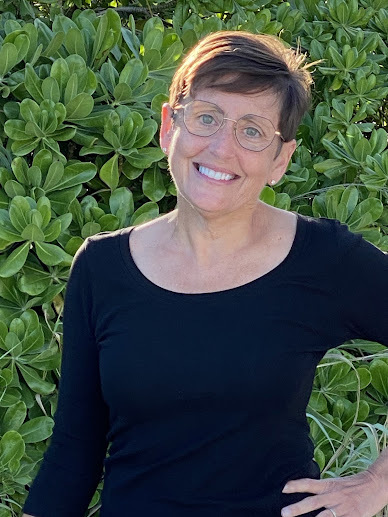
Renée D. Bondy taught in Women’s and Gender Studies atthe University of Windsor, where she facilitated courses on queer activism,women and religion, and the history of women’s movements. Her writing hasappeared in Herizons, Bitch, Bearings Online, and the HumberLiterary Review. She is a graduate of the Humber School for Writers. Renéelives in Chatham, Ontario. [non]disclosure is her first novel.
1 - How didyour first book change your life? How does your most recent work compare toyour previous? How does it feel different?
My début novellaunched just a couple of weeks ago, so I haven’t processed the effects of itbeing out in the world quite yet. The experience of writing the novel changedme, certainly. I wrote it in the seclusion of the covid-19 pandemic, which hadits challenges as well as its advantages. I was fortunate to be able to enrollin the graduate program in creative writing at the Humber School for Writers,and I also joined a stellar writing group. The opportunities to learn and growas a writer were life changing.
2 - How didyou come to fiction first, as opposed to, say, poetry or non-fiction?
Actually, I wrotenon-fiction first – articles, essays, creative nonfiction. Popular writing,mostly for feminist magazines, and scholarly writing were ways that my teachingand research interests in Women’s and Gender Studies found expression. I neverthought I would write fiction. Ever. The isolation of the pandemic, and mydesire to find a creative way to express my thinking on the subject of childsexual abuse in the Catholic Church led me to fiction. As strange as it sounds,the novel came as a surprise, even to me.
3 - How longdoes it take to start any particular writing project? Does your writinginitially come quickly, or is it a slow process? Do first drafts appear lookingclose to their final shape, or does your work come out of copious notes?
My thoughtprocess is lengthy. I am ‘in my head’ a lot at the outset of a new project. Ithought about the novel for years before I began writing. When I begin a shortstory, it is only after weeks of living with the characters. I am a slowwriter. However, with both the novel and short stories, my drafts are not sofar from their final shape.
4 - Where doesa work of prose usually begin for you? Are you an author of short pieces thatend up combining into a larger project, or are you working on a"book" from the very beginning?
Until recently,my initial ideas about the form and length of any project remained constantfrom start to finish. However, my current project, which is in its very earlystages, is a novel that grew out of a short story. I decided to keep going withit when I realized that I knew far more about the characters than I was able toconvey in the short story.
5 - Are publicreadings part of or counter to your creative process? Are you the sort ofwriter who enjoys doing readings?
I love readings.Perhaps it’s my background in teaching, but I like reading aloud and hearingwork read aloud. I’m definitely a writer who writes with my ear, and I thinkthere are layers of meaning revealed in tone, inflection, and cadence.
6 - Do youhave any theoretical concerns behind your writing? What kinds of questions areyou trying to answer with your work? What do you even think the currentquestions are?
My novel, [non]disclosure,is political. I hope to challenge the reader’s thinking about the abuses enabledby hierarchical religious institutions, and the misogyny and homophobiaimplicit in those structures. Another important takeaway from the novel is thecomplicated nature of silence and silencing; that is, how silence can beimposed and damaging, but it can also be chosen and protective. As a culture,we have redefined ideas about privacy in recent decades, so it's important to thinkabout the complex meanings of disclosure and secrecy.
7 – What doyou see the current role of the writer being in larger culture? Do they evenhave one? What do you think the role of the writer should be?
I definitelybelong to the camp of writers who feel that art is, in and of its nature,political. Whether by accident or by design, we change the world when we write.At least for me, I feel a responsibility to pursue truth in my writing. If I’vedone that, I’ve done my job.
8 - Do youfind the process of working with an outside editor difficult or essential (orboth)?
I suppose itwould depend on the editor, but my experiences have been overwhelminglypositive. I wrote for Herizons magazine for several years, and workedwith its long-time editor Penni Mitchell, who is a gem of an editor: sharp, perceptive,and incisive. Liz Johnston edited [non]disclosure. Not only is Lizexceptionally skilled, but she was sensitive to the traumatic material in themanuscript, which was of paramount importance to me. She and I had a wonderful collaboration,and I learned so much from her.
9 - What isthe best piece of advice you've heard (not necessarily given to you directly)?
A yellow Post-itabove my desk reads, No one is watching. This helps me remember that Iwrite for myself first, that nothing is set in stone, and it’s okay to takechances with my writing.
10 - How easyhas it been for you to move between genres (historical fiction to criticalprose)? What do you see as the appeal?
Since I completed[non]disclosure, I’ve been writing short stories. Most of them are muchlighter in subject and tone than the novel, and writing them has been anantidote to the stress of writing about trauma. My second novel will have adifferent structure than the first, and I think the challenge of figuring thatout keeps the writing fresh.
11 - What kindof writing routine do you tend to keep, or do you even have one? How does atypical day (for you) begin?
I’m not a morningperson – I wish I could be. I tend to write after coffee and the morning news,and before my daily swim.
12 - When yourwriting gets stalled, where do you turn or return for (for lack of a betterword) inspiration?
I walk. I read. Iwalk some more.
13 - Whatfragrance reminds you of home?
I grew up neartwo large distilleries – Hiram Walkers and Seagrams. When they were inproduction, the sweet, yeasty smell of mash permeated the town. That scent takesme back to childhood.
14 - David W.McFadden once said that books come from books, but are there any other formsthat influence your work, whether nature, music, science or visual art?
I’m not sure thatI can pinpoint a direct link between other forms of art and my writing. BecauseI’m an auditory person, I appreciate the musicality and poetics of prose. Also,while writing [non]disclosure I watched many excellent films whichaddressed the subject of sexual assault by Roman Catholic priests – fromfeature films like Doubt and Spotlight, to lesser-knowndocumentary films, like Prey. The emotional intensity of film made animpact on the work.
15 - Whatother writers or writings are important for your work, or simply your lifeoutside of your work?
I admire so manywriters : Miriam Toews, Heather O’Neil, Katherena Vermette, Casey Plett, Suzette Mayr, Alicia Elliott, Sigrid Nunez, Lauren Groff… I could go on and on. Diane Schoemperlen’s work has been a huge influence, particularly her penchant forlists, which I share.
16 - Whatwould you like to do that you haven't yet done?
Hmm… I might trymy hand at poetry one day. But not soon.
17 - If youcould pick any other occupation to attempt, what would it be? Or, alternately,what do you think you would have ended up doing had you not been a writer?
I love to bake,so if I had to choose a career that didn’t involve writing (except on birthdaycakes), I would be a baker.
18 - What madeyou write, as opposed to doing something else?
I often joke thatI am good at just two things – words and cake. My first career, teaching, utilizedmy skill with words. Writing was a natural next step.
19 - What wasthe last great book you read? What was the last great film?
All the Colourin the World, by C.S.Richardson, is a wonderful book, in content as well as design. I love a bookthat merges fiction and nonfiction, and Richardson does this brilliantly. Idon’t watch many films these days, but I recently saw Wicked Little Letters,starring Olivia Colman, which was highly entertaining.
20 - What areyou currently working on?
I always have ashort story in process. And I’ve started a new novel, which is in its wobblyearly stages. It’s an intergenerational story, and it explores ideas aroundsexuality and aging.
12 or 20 (second series) questions;
December 1, 2024
Ongoing notes: the ottawa small press book fair (part three: Jamie Sharpe + Monty Reid,
 Hereare some further items I recently picked up as part of
our thirtieth anniversary ottawa small press book fair
[see part one of my notes ; part two of my notes]. So many things! Maybe you should come out for the next one in June?
Hereare some further items I recently picked up as part of
our thirtieth anniversary ottawa small press book fair
[see part one of my notes ; part two of my notes]. So many things! Maybe you should come out for the next one in June?Comox BC/QC: Curious to see a new phafours chapbook byComox, British Columbia poet Jamie Sharpe, his Michael Hofmann: Poems (QC:phafours, 2024), following a small cluster of titles, including five full-length poetry titles through ECW Press. As the opening note of the smallcollection offers: “I was forty. I lived in an unassuming, but comfortable, vinyl-cladbox in a small Vancouver Island town. I’d completed an English degree, then anMFA. Somehow, I authored five books. Then I became Michael Hofmann. […] Six-monthsafter this puzzling transformation, as abruptly as it began, it ended. A modestsheaf of poems, written while I existed as Michael Hofmann, remained theresidue of altered days.” As he describes living an ordinary enough life withwife and two small children, there’s a curious element of this apologia that mightseem entirely familiar to anyone feeling the accumulation of life-shifts, nolonger who they once were; an evolution of being and becoming, entirely naturalthrough moments of wondering whatever became of one’s errant, fleeting youth. Orperhaps a writer with a handful of books, wondering if an evolution is required;if the writing requires a shift into or towards something other, else (this isall speculation, possibly; or overthinking on my part. Perhaps I take hisframing too seriously). Is this Sharpe attempting to adapt certain elements of style from the German-born translator, critic and poet Michael Hofmann, working to step into a voice beyond his own? As a writer, an artist, one needs to evolve, certainly.Is a change as good as a rest?
One in a Row
The Northern Lights aregone, leaving
Streets as the starsscar..
As insects increase,Southerners
Fall on boulevards. Even mykids try,
With disgusting, sincere voices,to make names
With their awkwardness.
I first turned to night,as coincidence.
Succumbed to the censusby accident.
Saw our constellation ina hospital,
Free. Mutilation, flash yourwhip
With its two goldenhooks: one in vain,
The other, across dumb distance,in lace.
Thepoems offer a curious shift on the work from his prior publications, one thatmight be less of a singular shift than part of a larger move into or towardsother structures, one step following another. It will be interesting to see wherethis particular direction might lead.
Ottawa ON/Montreal QC: Ottawa poet Monty Reid’slatest is Vertebrata (Montreal QC: Turret House Press, 2024), achapbook-length sequence on some of the makings and doings of some of his innerworkings of late, including issues he’s had with his back, one shoulder, arm:enough that he’s no longer able to play or perform music. “Articulates at theLuschka joints.” begins the small poem “CV3,” “Little Germanic teeth / subjectto degeneration. // And the foramen / little Latinate windows / graduallyclosing themselves. // And the nerves die / twitching with their languages. /Their little languages.” Composed as short, compartmentalized and numberedsections: seven poems in a sequence titled “Cervical Vertebra,” twelve poems inthe “Thoracic Vertebra” sequence, and five poems in the “Lumbar Vertebra”sequence, followed by the singular poems “Sacrum” and “Coccyx,” the penultimateof which reads, in full:
The federated bones havea single voice.
They do now.
Sacred bone, buttocksbone, broad bone
The bone that survives.
You sit there
and I am there for you
like a shovel in yourpelvic girdle
to shovel all the shit
out of your sedentarylife.
Reidhas long had an attention to the smallest detail, and the ability to extend aparticular thought or sequence of thoughts, offering sequences and evencollections that feel akin to a single, extended sentence-thought, holding a balancebetween the minutae of cause and effect, the physical and the metaphysical, boneagainst bone and the abstract idea. “Sit on the disc / of collagen,” writes thepoem “T6,” “where the metaphysical arteries / don’t penetrate // until youbecome / yourself. // Every bone / needs its cushion // which you are now.”
November 30, 2024
Alice Burdick, Ox Lost, Snow Deep: poems
I enjoy hearing yourghost stories.
Prove me wrong about the spiritworld.
Knocks, steps on stairs,in the great beyond
there’s a Q&A with arapping ghost.
We continue to turn intoflames, to ensure
a profitable pressconference. Research
into the blaze of finer flashbacks.Pranks
with apples on steps,, crackedtoe knuckles.
Sell tickets to theexpository tale. Very
dramatic, but people don’tlike the real story.
Onstage a foundationalfan
discovered the originalghost body. (“Old School Human Skills”)
 Thelatest full-length poetry title from Lunenberg, Nova Scotia poet Alice Burdick,following
Simple Master
(Toronto ON: Pedlar Press, 2002) [see my review of such here],
Flutter
(Toronto ON: Mansfield Press, 2008) [see my review of such here], Holler (MansfieldPress, 2012) [my review of such appears to have fallen off the internet],
Book of Short Sentences
(Mansfield Press, 2016) [see my review of such here] and
Deportment: The Poetry of Alice Burdick
, selected with an introductionby Alessandro Porco (Waterloo ON: Wilfrid Laurier University Press, 2018) [see my review of such here] (as well as a slew of chapbooks going back to 1993) is
Ox Lost, Snow Deep: poems
(Vancouver BC: Anvil Press, 2024), produced as partof editor Stuart Ross’ A Feed Dog Book imprint. Following the compactness ofthe poems of Book of Short Sentences, it is interesting to see howBurdick moves across longer forms. “To whom it may concern,” she writes, towardsthe end of the nine-page poem “Suspenseful demographics,” “you must surrender /the love song of sentient life. The truth is, / we will all be fuel cells. Youbrought me here / to speak with our fierce opponents, so / I might as wellspeak.”
Thelatest full-length poetry title from Lunenberg, Nova Scotia poet Alice Burdick,following
Simple Master
(Toronto ON: Pedlar Press, 2002) [see my review of such here],
Flutter
(Toronto ON: Mansfield Press, 2008) [see my review of such here], Holler (MansfieldPress, 2012) [my review of such appears to have fallen off the internet],
Book of Short Sentences
(Mansfield Press, 2016) [see my review of such here] and
Deportment: The Poetry of Alice Burdick
, selected with an introductionby Alessandro Porco (Waterloo ON: Wilfrid Laurier University Press, 2018) [see my review of such here] (as well as a slew of chapbooks going back to 1993) is
Ox Lost, Snow Deep: poems
(Vancouver BC: Anvil Press, 2024), produced as partof editor Stuart Ross’ A Feed Dog Book imprint. Following the compactness ofthe poems of Book of Short Sentences, it is interesting to see howBurdick moves across longer forms. “To whom it may concern,” she writes, towardsthe end of the nine-page poem “Suspenseful demographics,” “you must surrender /the love song of sentient life. The truth is, / we will all be fuel cells. Youbrought me here / to speak with our fierce opponents, so / I might as wellspeak.” Ox Lost, Snow Deep held as an assemblage ofthirteen longer poems, rife with surreal humour and first-person domestic,turns of phrase and observational twists. “It’s no problem to find the realstory.” she writes, as part of “Suspenseful demographics,” “Live a wet dream,of which / an attack started the trajectory.” In each of these extended poems,it seems there’s always a direction she’s heading in but in no hurry to land,weaving and bobbing across her short sentences to see what might be possiblealong the way, which most likely alters her destination. Follow along with her sequence“Big Trouble in Little China Trouble,” for example, composed in response to the1986 film Big Trouble in Little China, that begins: “Name, occupation:tourist bus. / Meat of this table a green flame. / Oh, sure. Sorcery because it’sreal. I talk / and eat a very small sandwich in the Pork Chop / Express. Thecheque is in the mail. / Rainy vegetables are funny. / Geese sing from boxes, /dumplings steam, / daytime dog.”
Whileeven an experienced reader of her work might wonder where she might be going,there’s never a sense of Burdick’s narratives at loose ends or lost,purposefully stretching out across a landscape of unexpected delights; we journeywith her, seeing what she catches across the lyric. “They were not statistics /to themselves,” she writes, as part of “Life irritates art,” “Potentiallyinfected salads // The printing press and mystic joy // The lyric, a scream //Too many write dull and straight / regardless of identity.” Her accumulationsoffer wisdoms and seek out questions, playful and incisive moments of sharpclarity carved through a musical flow of colliding words, sounds and ideas. “Ithought the creatures around me were both here / and not. Not an absence ofpresence,” she writes, as part of the poem “Practice,” “but human at somepoint, even as echoes. Echoes of air made into form; my demands / were simple:you may enter only / if you tell me something interesting. / Practice memory torelease into air.”
November 29, 2024
12 or 20 (second series) questions with Holly Pester
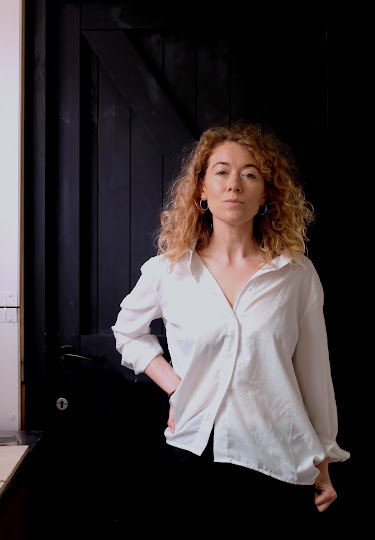 Holly Pester
is a poet and writer. She has worked in sound art and performance, with original dramatic work on BBC Radio 4 and collaborations with Serpentine Galleries, Women’s Art Library and Wellcome Collection. Pester lives in Colchester, England.
Holly Pester
is a poet and writer. She has worked in sound art and performance, with original dramatic work on BBC Radio 4 and collaborations with Serpentine Galleries, Women’s Art Library and Wellcome Collection. Pester lives in Colchester, England.1 - How did your first book change your life? How does your most recent work compare to your previous? How does it feel different?
a. Vocabulary, age, faith in attempts
b. Vocabulary, age, faith in attempts
c. Vocabulary, age, faith in attempts
2 - How did you come to poetry first, as opposed to, say, fiction or non-fiction?
How? Argh. Who knows. Playfulness?
3 - How long does it take to start any particular writing project? Does your writing initially come quickly, or is it a slow process? Do first drafts appear looking close to their final shape, or does your work come out of copious notes?
Slow slow slow. Like getting blood out of a stone. Lots of walks.
4 - Where does a poem or work of fiction usually begin for you? Are you an author of short pieces that end up combining into a larger project, or are you working on a "book" from the very beginning?
From the fragment outwards?
5 - Are public readings part of or counter to your creative process? Are you the sort of writer who enjoys doing readings?
Yes I am. It’s personal buzz, and a collective editorial moment.
6 - Do you have any theoretical concerns behind your writing? What kinds of questions are you trying to answer with your work? What do you even think the current questions are?
Oh goodness. Experimental writing has to create questions rather than answer them, no?
7 – What do you see the current role of the writer being in larger culture? Do they even have one? What do you think the role of the writer should be?
Being a teacher is the most important role in my life as a writer. It offsets personal desire for my own success. Which is fatal.
8 - Do you find the process of working with an outside editor difficult or essential (or both)?
Love editors. Love em.
9 - What is the best piece of advice you've heard (not necessarily given to you directly)?
Write with your weirdest impulses and habits, not against them.
 10 - How easy has it been for you to move between genres (poetry to fiction)? What do you see as the appeal?
10 - How easy has it been for you to move between genres (poetry to fiction)? What do you see as the appeal?I hope to always move around forms and shapes and durations of text.
11 - What kind of writing routine do you tend to keep, or do you even have one? How does a typical day (for you) begin?
I work full time. Any writing time has to shove its way in between writing reports, teaching and marking student work. The tension between labours is maybe the answer to the questions about ‘what theories’...?
12 - When your writing gets stalled, where do you turn or return for (for lack of a better word) inspiration?
Read. Read. Read. Watch a shocking movie.
13 - What fragrance reminds you of home?
Final demand envelopes.
14 - David W. McFadden once said that books come from books, but are there any other forms that influence your work, whether nature, music, science or visual art?
Sitcoms, performance art, clowning, dreams
15 - What other writers or writings are important for your work, or simply your life outside of your work?
My boyfriend, Margery Kempe, Muriel Spark
16 - What would you like to do that you haven't yet done?
Write a joke book. And a play. And a book of essays.
17 - If you could pick any other occupation to attempt, what would it be? Or, alternately, what do you think you would have ended up doing had you not been a writer?
A low paid administrator in a regional arts venue, with a burlesque practice on the side.
18 - What made you write, as opposed to doing something else?
I just don’t know.
19 - What was the last great book you read? What was the last great film?
The Sea, The Sea by Iris Murdoch
The Falling, Carol Morley
20 - What are you currently working on?
Getting my students through their degree… Another book of poetry.
12 or 20 (second series) questions;
November 28, 2024
three VERSeFest interviews: Alice Burdick, Manahil Bandukwala + Armand Garnet Ruffo,
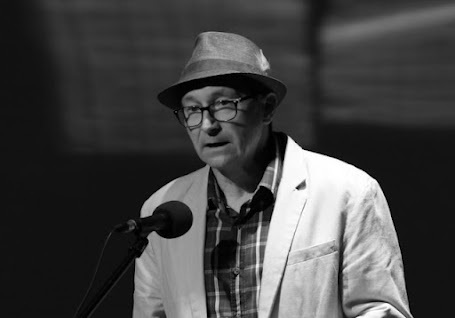 I've been working a trio of interviews with poets as part of
this weekend's VERSeFest "Fall into VERSeFest" mini-festival (that starts TONIGHT)
, all of which I've been posting recently over at
periodicities: a journal of poetry and poetics
(there was also a sequence of interviews for our spring festival, if you recall: Chris Turnbull, Klara du Plessis, Laila Malik, Jason Christie, Sandra Ridley, Khashayar "Kess" Mohammadi + AJ Dolman). The three new interviews posted include: Alice Burdick (she has a new title with Anvil Press, and reads tonight at RedBird: have you tickets yet? she's also doing an in-person poetry workshop on Saturday!),
Manahil Bandukwala
(who also reads tonight, and has a new title with Brick Books) and
Armand Garnet Ruffo
(who has a new award-winning title with Wolsak and Wynn, and reads on Saturday). I actually interviewed Ruffo prior, ten years ago for Jacket2: do you recall? Why not read and compare? Did I ask him the same questions? Did he provide the same answers?
I've been working a trio of interviews with poets as part of
this weekend's VERSeFest "Fall into VERSeFest" mini-festival (that starts TONIGHT)
, all of which I've been posting recently over at
periodicities: a journal of poetry and poetics
(there was also a sequence of interviews for our spring festival, if you recall: Chris Turnbull, Klara du Plessis, Laila Malik, Jason Christie, Sandra Ridley, Khashayar "Kess" Mohammadi + AJ Dolman). The three new interviews posted include: Alice Burdick (she has a new title with Anvil Press, and reads tonight at RedBird: have you tickets yet? she's also doing an in-person poetry workshop on Saturday!),
Manahil Bandukwala
(who also reads tonight, and has a new title with Brick Books) and
Armand Garnet Ruffo
(who has a new award-winning title with Wolsak and Wynn, and reads on Saturday). I actually interviewed Ruffo prior, ten years ago for Jacket2: do you recall? Why not read and compare? Did I ask him the same questions? Did he provide the same answers?


